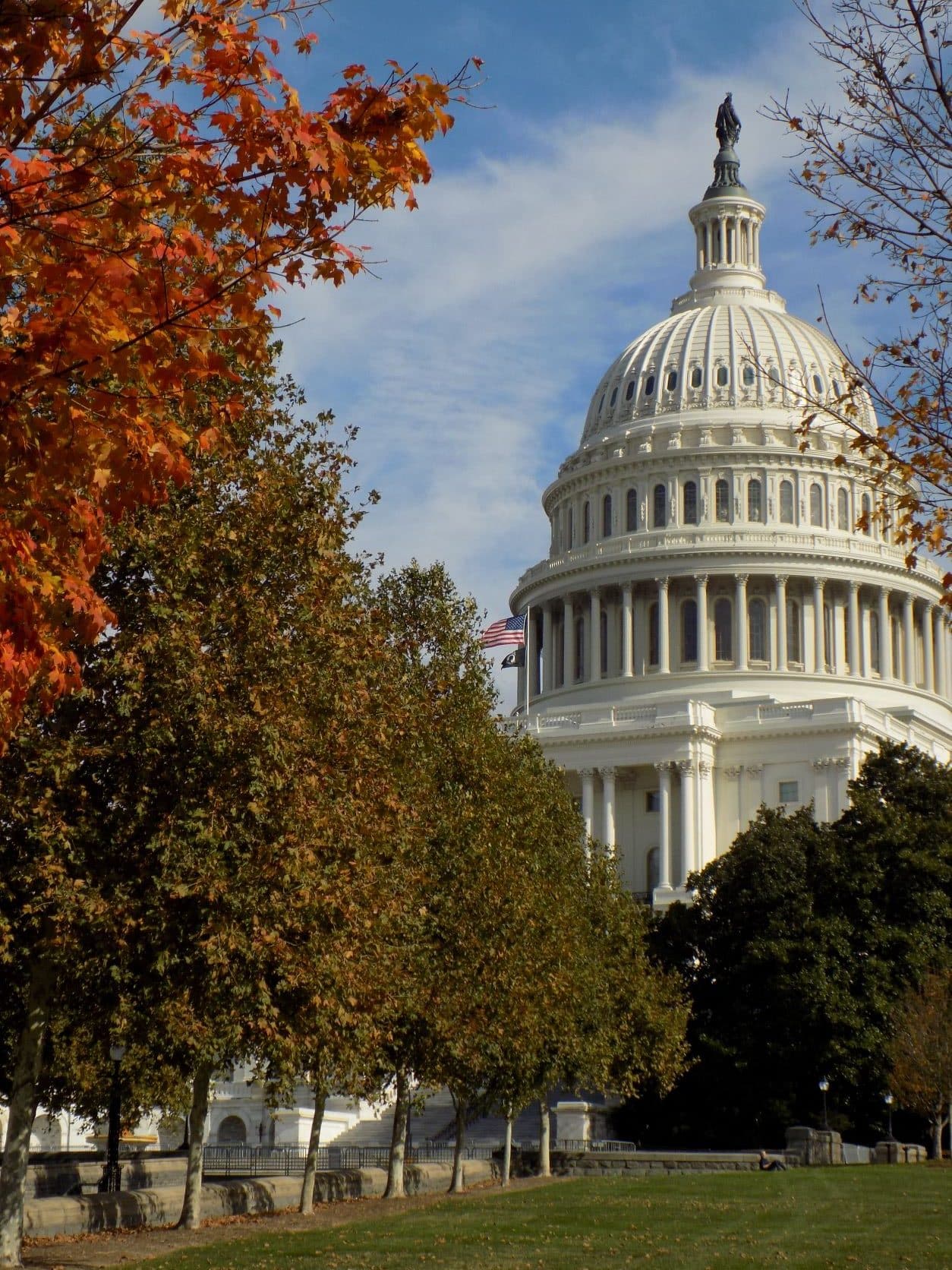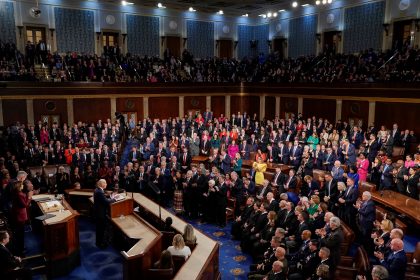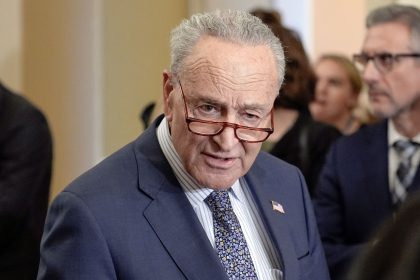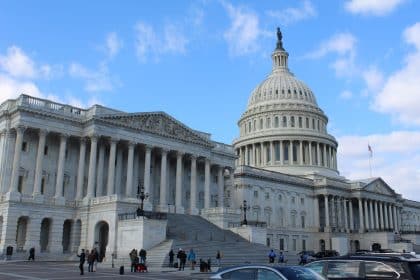Fiscal Watchdog Says Recess Will Give Senate Time to Fix Flaw in Relief Funding

WASHINGTON — The bipartisan COVID-19 relief bill introduced this week in the Senate had a fatal flaw beyond a lack of support from Republicans, its “pay-as-you-go” billing was completely illusory, a prominent fiscal watchdog said Friday.
The Concord Coalition is a nonpartisan organization that has been advocating for responsible fiscal policies from the federal government since 1992.
It was founded by the late former Sen. Paul Tsongas, D-Mass., former Sen. Warren Rudman, R-N.H., and former Commerce Secretary Peter Peterson.
Writing for the organization’s blog on Friday, Tori Gorman, its policy director, said the COVID-19 deal announced by Sen. Majority Leader Chuck Schumer, D-N.Y., and Sen. Mitt Romney, R-Utah, on Tuesday was cause for “hopeful optimism.”
After all, not only would the tentative agreement replenish emergency funds needed to restock federal supplies of vaccines, therapeutics and testing equipment, but it would be paid for by offsets that were both front-loaded and large.
But according to Gorman, the coalition’s enthusiasm for the proposal was short-lived after its members realized one of the largest offsets in the package was actually “a mirage.”
To understand how it came to that conclusion, one has to first grasp what a truly chaotic year it was for the understaffed agencies that keep track of federal spending, the Office of Management and Budget, a creature of the executive branch, and the Congressional Budget Office, which “scores” or assesses the fiscal impact of legislation under consideration by Congress.
“Ordinarily what happens is the CBO gets its preliminary baseline done in January and its scoring baseline done in March, along with their preliminary estimate of the president’s budget, which should have been done in February,” Gorman said during a phone interview with The Well News. “None of that happened this year, for a variety of reasons.
“As you know, Congress didn’t get a budget for fiscal 2022 wrapped up until March 11, when it passed the omnibus bill, and not having the numbers for 2022 makes it really hard to put together numbers for a budget for 2023,” she said.
“So the first issue was Congress not getting its homework done on time,” Gorman said.
“At the same time, the CBO, like a lot of other federal agencies, is critically understaffed, and they were being driven hard by the massive changes that were being made on a daily — and sometimes hourly — basis to the Build Back Better package,” she said.
So between the two — the failure to get the appropriations for 2022 done on time and the full court press on Build Back Better — they just didn’t have the time to get their baseline done as they normally would.
“And if they had, Romney and Schumer would have known that this recession would not result in any offsets,” Gorman added.
The offset that troubles the Concord Coalition is the rescission of $2.3 billion from the Aviation Manufacturing Jobs Protection Program, which was intended to preserve airline manufacturing jobs during the pandemic.
The program was part of the $1.9 trillion American Rescue Plan Act that Congress passed and President Biden signed in March 2021. The act earmarked a total of $3 billion for the aviation manufacturing program, but when the deadline for applications passed six months later, only $717 million in funds had been allocated.
By law, the Transportation Department was unable to reallocate the money, so when the Office of Management and Budget published its new budget baseline last month, it zeroed out the available funding balance for the program.
This, Gorman wrote, “was appropriate.”
The problem, Gorman continued, is the Congressional Budget Office is months behind producing its own scoring baseline for 2022.
That means it is still relying on its July 2021 baseline to estimate the budgetary impacts of bills and amendments.

“That baseline, assembled prior to the aviation program application deadline, still shows money available to obligate in the aviation program (which, if rescinded, would produce budgetary savings),” she wrote. “When CBO produces their 2022 scoring baseline the week of May 23, the aviation account will be adjusted to reflect the same zero balance as in the Biden administration’s baseline.
“Simply put,” she said, “this offset is not real; it is merely the product of a stale baseline that has a shelf-life of six more weeks.”
Gorman doesn’t place blame on Schumer or Romney, arguing “it is quite possible [they] were unaware of this when they assembled” their compromise.
“No one is suggesting any nefarious motives,” she wrote.
But given the size of the federal budget — an estimated $5.5 trillion in FY 2022 — and the amount that needs to be offset — $2.2 billion — it should also be easy to offset, she suggested.
To continue to rely on the old number would be like “claiming proceeds from the sale of a home you no longer own,” Gorman wrote.
“My point,” she told The Well News, “is to say, ‘Okay, Leader Schumer, Sen. Romney, now that you know that this offset that you’ve identified is not legitimate, go back and find a different offset that actually meets the specifications you set.’
“Romney’s promise for bringing 10 Republicans on board to help pass this legislation was that it would be offset, and offset meaning on the outlay side of the ledger, because that’s what drives deficits. It’s revenues minus outlays, not revenues minus budget authority.
“You know, back in the day, when we had discretionary spending caps, appropriators would rescind money from programs to create room for budget authority, but they wouldn’t have any outlay savings,” she said. “They could do that because the caps were enforced on budget authority.
“In this case, Romney’s position is, ‘Nope, I don’t want to have to issue more debt in order to finance this’. … So what he’s saying is, ‘I’m looking at this purely from the outlay side.’ So knowing what we know now, they really should go back and find another offset.”
How easy is that?
“Well, it depends on your definition of easy,” Gorman said. “I mean, there’s lots of COVID money out there that hasn’t been obligated yet. And the states are awash in COVID money. They have so much of it that they’re passing tax cuts.
“Congress has broadened the scope of what states can use that money for; at first, it could only be used for COVID-related expenses. And states were like, ‘Hey, you know, we’re not having a problem with COVID-related expenses, what we have had a problem with, as you shut down the economy, is we’re not collecting tax revenues the way we should. So please give us the opportunity to use this money to backfill the revenue losses.’
“Well, the economy bounced back from COVID, way faster than anybody anticipated. So the states are all awash in this COVID money. And they don’t really know what to do with it,” she said.
Gorman said because huge budget surpluses can be a political liability for a politician, many have opted to remit COVID-19 relief surpluses back to their constituents in the form of tax cuts.
“In the original omnibus bill, Schumer and House Speaker Nancy Pelosi, [D-Calif.], tried to claw back some of that state and local money. But that really ticked some members of their caucus off, and they had to yank that provision from the omnibus bill.
“The bottom line is, there are pots of money out there that they can draw an offset from, but every pot of money has a constituency. And if you’re in the business of counting votes, and you’ve got such narrowly divided chambers, it makes it hard to decide whose money to use as an offset.”
Of course, you don’t always have to cut spending to offset. You can always opt to generate new revenues.
“But that decision comes with a whole other set of challenges,” Gorman said. “Biden has said he’s not willing to raise taxes on anybody earning less than $400,000 and Republicans have said they aren’t willing to raise taxes on anybody.
“So when you take revenues off the table, and you take a whole bunch of spending off the table, that’s what makes it difficult,” she continued. “I mean, policywise, this isn’t difficult. There’s plenty of money and plenty of options. There are organizations like the Committee for a Responsible Federal Budget that basically have a laundry list of possible offsets. It’s just the political will that’s missing. And I think that’s what I find so upsetting.
“If Congress can’t find a $2 billion offset for this legislation, what signal are they sending about the hard choices we know lie ahead?” she said. “What are they going to do when they need to find ways to pay for things like Medicare and Social Security?
“That’s my big concern. I mean, if you think finding $2 billion for COVID relief is hard, what happens when you have to come up with $2 trillion to maintain the solvency of the Social Security Trust Fund?” Gorman added.























